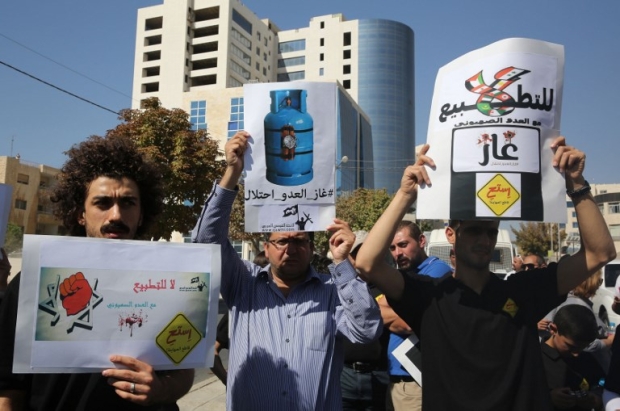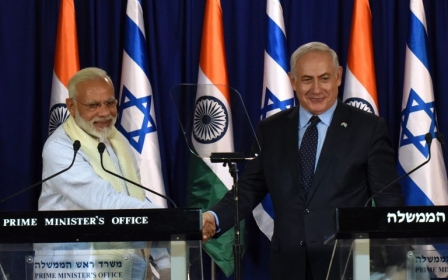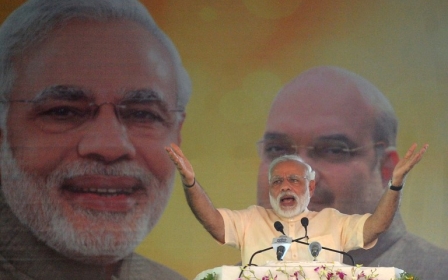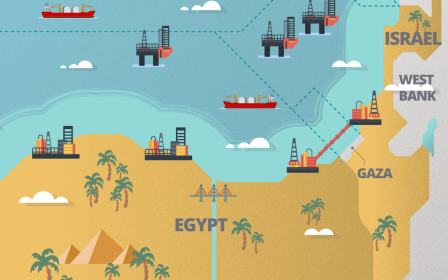Modi is sacrificing India's interests at the altar of Israeli apartheid
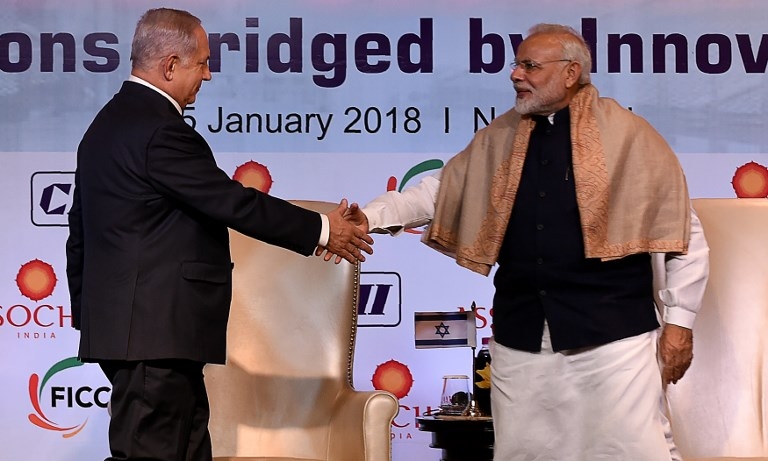
Israel has lobbied the White House relentlessly to destroy the Iran nuclear deal and impose new sanctions on Iran. As European countries don’t support this agenda, other partners needed to be found, and India was an obvious choice.
Even before the US State Department announced its plan to stop as many countries as possible from importing Iranian energy resources, Nikki Haley, the permanent representative of the US to the United Nations, visited New Delhi to drive home her country's demands. Obediently, India's oil ministry asked refiners to prepare for a "drastic reduction or zero" imports of Iranian oil from November, although the foreign minister took a more cautious stand.
Iran is one of India's largest suppliers of oil, and a number of key projects are under way, including negotiations on development of the 22-trillion-cubic-foot Farzad B gas field, India taking control of the Iranian port of Chabahar, and negotiations for a pipeline from Oman and Chabahar to India.
Islamophobic nationalism
The reason why the US nevertheless gambles on India's cooperation in isolating Iran is ideological. US President Donald Trump, Israel and India’s far-right government are connected through a common supremacist, Islamophobic vision of nationalism. Israel has successfully exported its project of a world of walls, from the US-Mexico border to the India-Pakistan Line of Control. Indian Prime Minister Narendra Modi has gone out of his way to elevate Israel to a "strategic partner", signing two dozen cooperation agreements over the last year, from security to energy.
New MEE newsletter: Jerusalem Dispatch
Sign up to get the latest insights and analysis on Israel-Palestine, alongside Turkey Unpacked and other MEE newsletters
India already showed its readiness to subordinate the interests of its own energy sector to a global, extreme, right-wing agenda, when it pushed an Indian consortium led by public sector corporation ONGC to participate in Israel’s gas tender.
India’s involvement in Israeli gas deals will enable substantial revenues to be used in Israel’s militarisation and de facto annexationist policies in occupied Palestine, along with the exploitation of its natural resources
According to Israel’s official propaganda script, awarding India’s consortium with a drilling licence in its gas fields late last year constituted yet another act of Israeli support and opportunities granted to India. But contrary to Israel’s claims, Indo-Israeli deals have repeatedly resulted in nothing more than India providing apartheid Israel with markets, investments, big data, cheap labour and more. The energy sector, in particular this gas deal, is a prime example.
India helped Israel's gas tender to be considered only a "disappointment" due to the few number of bidders, rather than a complete disaster. For India’s public energy corporation ONGC, however, the deal seems deleterious.
Israel extended the tender deadline twice before a single corporation agreed to submit a bid. When it finally closed, Israel awarded six out of 24 offshore blocks for tender, each having received only one bid by the only two participants - Greece's Energean and the Indian consortium.
The possibility of legal challenges from Lebanon as the gas fields straddle its territorial waters, security concerns over flare-ups of conflict, the huge costs of gas drilling in the Mediterranean, corruption in the Israeli government, and competition from larger and cheaper gas discoveries in neighbouring countries have held off investors.
Questions about viability
That ONGC joined on the basis of government indications rather than scientific and commercial evaluation is evidenced by the fact that after winning the tender, ONGC stated that studies on the viability of drilling still had to be done - even after the consortium was required to deposit a guarantee of $2.5m to $10m.
For ONGC, Israeli gas is economically not viable for exploration. India currently pays $3.06 per million British thermal unit (mBtu) of gas and $6.78 per mBtu for new gas produced from difficult areas. Israel calculates the cost of liquefaction, transport and regasification at $4-7 per mBTU.
An Indian oil-sector expert said drillings were only economically viable if oil were to be found; so far, there are no indications of any relevant reserves in Israel’s submarine fields, and no viable transport or export solutions. The gas pipeline through Jordan is highly contested, exports through Egypt pose security concerns and public opposition, and the EastMed pipeline to Europe has encountered difficulties at the feasibility study level.
The idea for a Haifa-Eilat pipeline come liquefied natural gas facility is straight out of the dreams of Theodor Herzl, the founding father of Zionism, about cross-Israel connections. An infrastructure project to be built almost exclusively for ONGC’s gas block, as the remaining gas reserves just about cover Israel's own energy needs, is not viable.
This deal adds to the successive growth of liabilities over the last five years that have brought ONGC for the first time in its history into the negative accounts. After ONGC had to pay the more than $1bn for Modi’s failed gas adventure in Gujarat, it must now finance the unviable Israeli deal. Downstream, the Indian public will bankroll these costs, while a more complicated framework for India to meet its own energy needs will have negative impacts on the economy and consumers.
Geopolitical hurdles
Geopolitically, the deal introduces further hurdles for ONGC, including among those oil and gas-producing states that don’t back US-Israel projects for the Middle East.
No business with Israel is "neutral". India's involvement in Israeli gas deals will enable substantial revenues to be used in Israel’s militarisation and de facto annexationist policies in occupied Palestine, along with the exploitation of its natural resources. Curtailing the energy supply to Gaza is among the key pillars of Israel’s illegal and inhumane siege. Statements by Israeli officials indicate just how these discoveries have factored into the enforcement of its illegal naval blockade of Gaza.
By participating in Israel’s business with disputed natural reserves and its illegal use of energy to finance and maintain its illegal policies of occupation and apartheid, India not only places itself squarely on the wrong side of history and cements its reversal of support for Palestinians, but also enters full speed into other regional conflicts.
The new Indian energy policy framework will likely also include US ally Saudi Arabia, which is increasing crude production as the US withdrawal from the Iran nuclear deal pushes energy prices up. This brings more funds for Saudi Arabia’s war on Yemen, while Riyadh is also a frontline supporter of Washington's “Deal of the Century”, which essentially aims to liquidate the Palestinian cause.
The Indo-Israeli gas deal is an ideological investment that connects India ever closer with Israeli apartheid and Trumpism, harming the Palestinian cause and undermining India's economic interests. One hopes that within India's political establishment, there are still enough voices to stand up against this.
Stopping Modi from sacrificing ONGC and India's historic support of Palestine at the altar of Israeli apartheid would be a crucial step towards recovering India’s historic commitment to sovereignty, secularism, anti-colonial values and an independent foreign policy.
- Maren Mantovani is coordinator of international relations of the Palestinian Grassroots Anti-Apartheid Wall Campaign, www.stopthewall.org.
The views expressed in this article belong to the author and do not necessarily reflect the editorial policy of Middle East Eye.
Photo: Indian Prime Minister Narendra Modi shakes hands with Israeli Prime Minister Benjamin Netanyahu during a business summit in New Delhi on 15 January 2018 (AFP)
Middle East Eye delivers independent and unrivalled coverage and analysis of the Middle East, North Africa and beyond. To learn more about republishing this content and the associated fees, please fill out this form. More about MEE can be found here.



